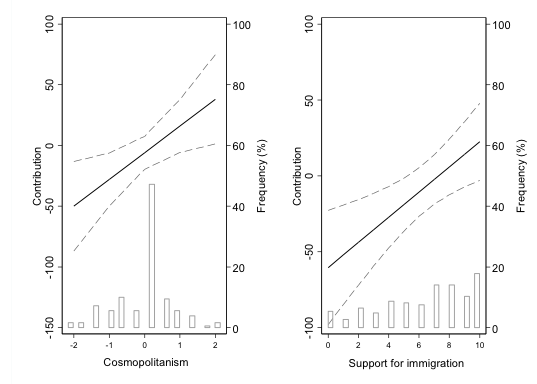

 What does it mean to be cosmopolitan – to be the kind of ‘global citizen’ whom Theresa May famously described as ‘citizens of nowhere’? Does it really make people care as much for people in other countries as they do for those of the same nationality, or do cosmopolitans pay only lip service to EU solidarity? A study by (left to right) Theresa Kuhn (University of Amsterdam), Hector Solaz (University of Essex) and Erika van Elsas (University of Amsterdam) in the UK and Germany found this demographic practises what it preaches. Less cosmopolitan individuals, on the other hand, put people who share their nationality first.
What does it mean to be cosmopolitan – to be the kind of ‘global citizen’ whom Theresa May famously described as ‘citizens of nowhere’? Does it really make people care as much for people in other countries as they do for those of the same nationality, or do cosmopolitans pay only lip service to EU solidarity? A study by (left to right) Theresa Kuhn (University of Amsterdam), Hector Solaz (University of Essex) and Erika van Elsas (University of Amsterdam) in the UK and Germany found this demographic practises what it preaches. Less cosmopolitan individuals, on the other hand, put people who share their nationality first.
“Too many people in positions of power behave as though they have more in common with international elites than with the people down the road, the people they employ, the people they pass in the street. If you believe you’re a citizen of the world, you’re a citizen of nowhere. You don’t understand what the very word ‘citizenship’ means”.
In her keynote speech at the 2016 Conservative Party conference, British PM Theresa May disparaged people who are in favour of open borders – and of a United Kingdom in the EU – by taking up a recurring critique of cosmopolitanism: cosmopolitans are simply too elitist, mobile, and detached from society to care for ‘ordinary’ people in need. While cosmopolitanism entails more open and global orientations, the argument goes, this openness does not translate into support for redistribution either at home or abroad. As Craig Calhoun puts it, “[i]f there is to be a major redistribution of wealth […] it is not likely to be guided by cosmopolitanism”. It is therefore not obvious that cosmopolitanism breeds solidarity in the European Union.

Against the backdrop of the euro crisis, solidarity has become increasingly important for further integration. It is therefore relevant to know whether cosmopolitans – who generally tend to embrace European integration – are also willing to pay a price for it by helping out other member states in need. Recent analyses of opinion surveys indeed suggest that people who have a more cosmopolitan disposition, identify as Europeans, and interact across borders are more supportive of fiscal solidarity in the EU, i.e. they are in favour of helping another EU member state in economic difficulties. However, it is possible that these stated preferences are mere lip service: people who say they support such policies do not necessarily follow up on it by, for example, being willing to pay higher taxes in order to help other member states in need. This raises an important question: Are cosmopolitan individuals willing to practise what they preach and share resources with other Europeans?
To answer this question, we conducted laboratory experiments in four locations in the United Kingdom and Germany. In these experiments, participants earned money and were given the choice whether to keep it and take it home or to share (part of) it with randomly chosen, anonymous participants in either the same location, the same country, or another European member state. Subsequently, participants filled out a short survey that included questions on their concern about humankind, support for immigration, identification as European, and support for European integration.
We found that participants who scored high on these items did not discriminate against European recipients, i.e. they did not give significantly less to recipients from another member state than to recipients from their own country. In contrast, participants with less cosmopolitan attitudes did take into consideration where their money went to: they gave significantly less to recipients from another EU member state than to recipients from their own country. This relationship is visualised in figure 1. In the left panel, we see that participants scoring low on the cosmopolitanism scale give significantly less to European recipients compared to co-nationals, while cosmopolitans tend to give somewhat more to European recipients. It is noteworthy that the majority of participants have a medium score of cosmopolitanism and do not discriminate either way. Participants who oppose immigration to their country give significantly less to a European recipient compared to a national recipient, while participants in favour of immigration do not discriminate in their contributions (right panel).
Figure 1: Effect of European recipient on contributions as cosmopolitanism scale (left) and immigration support (right) increase
Note: The solid line represents the marginal effect of having a European recipient on the contribution, for different levels of cosmopolitanism/immigration support (with 95% confidence intervals).
Critics of cosmopolitanism could maintain, however, that cosmopolitans, while not discriminating, are overall less generous than people with more national dispositions. In other words, they might be indiscriminately stingy. Contrary to this expectation, we found that participants scoring high on cosmopolitanism contributed more also in absolute terms. These results are robust also when accounting for participants’ socio-economic status, political ideology, and altruism. In our paper, we present analyses of the voter survey of the European Election Study which confirm the general applicability of our findings across the European Union; cosmopolitan attitudes are the most consistent predictor of international solidarity across countries. Taken together, these findings challenge the assertion that cosmopolitans are “citizens of nowhere” who are not ready to share resources. On the contrary, our results imply that cosmopolitans are practicing what they preach, and are at the forefront of international solidarity in the EU.
This post represents the views of the authors and not those of the Brexit blog, nor the LSE.
Theresa Kuhn is Associate Professor in the Political Science Department at University of Amsterdam. She obtained her PhD from the European University Institute, Florence and was a postdoctoral research fellow at Nuffield College, Oxford. Theresa is interested in how Europeans react to globalisation and European integration in their attitudes and collective identities. She is the author of “Experiencing European Integration. Transnational Lives and European Identity” (Oxford University Press 2015).
Hector Solaz is currently a senior research officer at the ESSEXLab and the Department of Government of the University of Essex. Hector received his PhD in economics from the University of Valencia and previously held positions at the University of Birmingham and Oxford. His research interests lie within behavioural science and political economy, mainly using experimental methods to study the economic and political implications and foundations of behavioural phenomena. In particular, he focuses on the determinants of cooperation in collective actions, the emergence and enforcement of social norms, and the role of behavioural biases on voting.
Erika van Elsas is postdoctoral research fellow at the Amsterdam School of Communication Research (ASCoR), University of Amsterdam, and she holds a PhD in Political Science from the same university. Her research interests center around electoral behaviour, Euroscepticism and political trust. Currently, she works in the EUROPINIONS project, analyzing the causes and consequences of change in public opinion about Europe.








May’s speech was referring to the international business elite – people of wealth – not ordinary people. Why is that not mentioned given her words used as a basis for the study?
How people spend imaginary money could well be an expression of how they want to be regarded. I can be generous to a fault with money I do not have. I can make a gesture that reflects a political disposition I have.
‘Cosmopolitanism’ is measured by questions on: people’s concern about humankind, support for immigration, identification as European, and support for European integration. These seem self serving criteria. What about how we actually act on the world to help mankind? Many would argue republican citizenship is the best model, not the EU, and not a further integration of the EU. The idea that identification with the EU reflects ‘international solidarity’ is contested, but not apparently in this study. Amongst those who may contest it would be many Greeks, quite a few Leave voters in the UK and African migrants enduring hell on the Libyan coast. In political context, the cosy world of EU cosmopolitanism isn’t always what it claims to be.
Political science of this type seems completely unable to grasp or even address the political moment. It seems tautological – cosmopolitan attitudes are defined as being pro EU, so we find that those who score higher on cosmopolitan attitudes are more pro EU. Some of these empirical studies seem to be designed to get the desired result.
Solidarity has indeed become increasingly important for further integration of the democratic sovereign nation-state. The forced federalisation of EU member countries into a super-state, however, requires the peoples acquiescence in these member states. It has nothing to do with solidarity if the EU Commission, or who ever is really in control, forcibly takes money from some peoples to permanently sluice money to other peoples who are stuck with a strong currency, a weak economy and, worse, enduring endemic corruption which cannot be tackled while it is being fed by endless support by the taxpayers in other EU member countries.
If you look at the original paper, “cosmopolitanism” is defined in such a way that I don’t believe it is an independent variable. In other words it is measuring something very similar to people’s desire to redistribute money to other countries and unsurprisingly has a close correlation to this.
Political Science..the ultimate oxymoron.
Cosmopolitanism is a simplistic concept in this context.
The UK shows selective cosmopolitanism towards Indian and Pakistani immigrants and closes up against a relative minority of EU immigrants.
On the continental side, Germany is the greatest net contributor to the EU and post-WW2 the Germans have been educated (longer and more successful in the west) to extend their cultural identity to embrace a German Europe, even if they will never admit it. The EU6 resembles Charlemagne’s Holy Roman Empire after all. Is that cosmopolitanism?
Germany is doing quite well playing a strong 2nd fiddle to French grandeur. Look up Macchiavelli for the benefits of an alliance for the strongest member.
This European “cosmopolitanism” excludes, in particular, states that feature feudal statism, state religion, or open rebellion to socioeconomic convergence. All three are common traits of Greece and the UK (well, statism in the UK is yet to come after the next general elections),
Beyond these limits, citizens do not accept each other as a fellow Europeans, emotionally.
The limits of bite inhibition (aka “soft mouth”) are mutual and can be seen at the economic canibalism of EU27 members regarding EMA, EBA, and the London banks, as well as Greek and Polish demands for war reparations and Greek and British failure for a trustful sharing of economic information.
The hallmark of EU fairness is to define criteria of convergence (“Chapters”) and let the periphery decide themselves whether they want to converge socioeconomically with strategic and economic benefits (Cyprus, Italy, Ireland, Poland) or whether they prioritize their national identity as defined by separation of church and state, tax transparency, multi-party system, OECD ideals, etc.
On the basis of these criteria, the peripherical societies are free to discuss and fight internally whether they want to belong or not. The British cabinet does that at the moment.
Give them time to suffer, complain and learn!